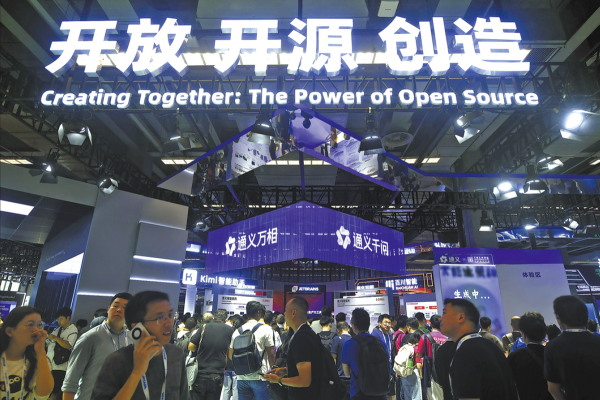
- Home
- Media Center
-
Events
- Wuzhen Summit
- Regional Forums
- Practice Cases of Jointly Building a Community with a Shared Future in Cyberspace
- World Internet Conference Awards for Pioneering Science and Technology
- The Light of Internet Expo
- Straight to Wuzhen Competition
- Global Youth Leadership Program
- WIC Distinguished Contribution Award
- Membership
- Research & Cooperation
- Digital Academy
-
Reports
- Collection of cases on Jointly Building a Community with a Shared Future in Cyberspace
- Collection of Shortlisted Achievements of World Internet Conference Awards for Pioneering Science and Technology
- Reports on Artificial Intelligence
- Reports on Cross—Border E—Commerce
- Reports on Data
- Outcomes of Think Tank Cooperation Program
- Series on Sovereignty in Cyberspace Theory and Practice
- Other Achievements
- About WIC
- 中文 | EN

Alibaba Cloud joins latest elite generative LLM club
Open-source Qwen 2.5 models able to support autos, gaming and sci-tech

Visitors gather at Apsara Conference, Alibaba Cloud's annual flagship event, in Hangzhou, Zhejiang province, on Thursday. [Photo for China Daily]
Alibaba Cloud, the cloud computing unit of Chinese tech heavyweight Alibaba Group Holding Ltd, on Thursday unveiled the latest version of its artificial intelligence-powered large language models, Qwen 2.5, a move industry experts said will bolster the large-scale commercial application of fast-developing generative AI technology.
The newly launched open-source Qwen 2.5 models, ranging from 0.5 billion to 72 billion parameters, boast enhanced capabilities in math and coding, and are able to support over 29 languages, while catering to a wide array of AI applications across various sectors such as automobile, gaming and scientific research, the company said.
"Alibaba Cloud is investing, with unprecedented intensity, in the research and development of AI technology and the building of its global infrastructure," said Wu Yongming, CEO of Alibaba Group and chairman and CEO of Alibaba Cloud Intelligence, at the Apsara Conference, Alibaba Cloud's annual flagship event.
Wu said large language model technologies have made rapid progress, and currently, they can handle multimodal tasks including text, speech and vision, understand requirements of humans and finish complex programming tasks. Meanwhile, the inference costs of LLMs have dropped exponentially, he added.
"We remain committed to investing in advanced AI infrastructure to foster the widespread adoption of generative AI technologies across different industries," said Zhou Jingren, chief technology officer of Alibaba Cloud Intelligence.
Zhou said the release of Qwen 2.5 multimodal models is set to empower developers and corporations of all sizes, enhancing their ability to leverage AI technologies and further stimulating the growth of the open-source community. So far, the Qwen models have surpassed 40 million downloads since its debut in April 2023.
Alibaba Cloud has also announced an upgrade to its proprietary flagship model Qwen-Max, saying its capabilities are on par with those of US company OpenAI's most advanced GPT-4o model.
The enhanced Qwen-Max model has demonstrated strong performance in various areas such as language comprehension, reasoning, math and coding compared with other state-of-the-art models.
Charlie Dai, vice-president and principal analyst at Forrester, a research firm, said, "As a pioneer in China's public cloud market, Alibaba Cloud has been making strategic investments to build comprehensive AI capabilities for model as a service or MaaS around foundation models from infrastructure to applications."
Dai said the latest product announcements demonstrate its strengths in research and development, adding the release of open-source LLMs will substantially help enterprises and developers to accelerate AI innovation by working with other tech leaders in the cloud and AI ecosystem.
Chinese tech companies' continuous technological advancements in LLMs will further promote the popularization of AI models, and bring fresh business opportunities for domestic AI servers, cloud computing and chip companies, said Lu Yanxia, research director at market research company International Data Corp China.
Highlighting that the multimodal LLM is an undeniable future development direction for generative AI technology, Lu said Chinese tech enterprises should pool more resources into improving computing power, algorithms and quality of data to narrow the gap with the US in the generative AI sector.
Pan Helin, a member of the Expert Committee for Information and Communication Economy, which operates under the aegis of the Ministry of Industry and Information Technology, said the LLMs necessitate higher demand for data and knowledge in professional fields, and for talent that can fine-tune specialized models based on diverse industrial demands.
Pan emphasized more efforts should be made to bolster the vertical industrial application of LLMs in a wider range of sectors.
Alibaba Cloud also unveiled a new text-to-video model, which is capable of generating high-quality videos in a wide variety of visual styles based on Chinese and English text instruction and transforming static images into dynamic videos.
The company has announced a price reduction of 85 percent on its Qwen-Turbo LLM, while another two types of its LLMs also saw price cuts.
A report from McKinsey & Co, a global consultancy, said that generative AI will add between $2.6 trillion and $4.4 trillion in annual value to the global economy, resulting in a significant impact across all sectors of industry.

The World Internet Conference (WIC) was established as an international organization on July 12, 2022, headquartered in Beijing, China. It was jointly initiated by Global System for Mobile Communication Association (GSMA), National Computer Network Emergency Response Technical Team/Coordination Center of China (CNCERT), China Internet Network Information Center (CNNIC), Alibaba Group, Tencent, and Zhijiang Lab.





